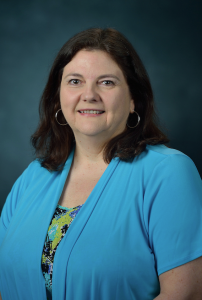
Dawn Wilkins
As the first female department chair in the University of Mississippi School of Engineering, Dawn Wilkins brings both experience and expectations to the position.
Wilkins is already working to build upon the foundation laid by her predecessor, H. Conrad Cunningham, who retired this summer as chair of the Department of Computer and Information Science after leading the department to new heights over the last 14 years.
“In the short term, I’d like to expand our offerings for Honor’s College students, support the proposed new minor in digital media studies and build an active learning lab to provide additional hands-on opportunities for our CS majors,” Wilkins said.
“The department plans to offer an honors section of our introductory CS course in fall 2016. We are in the final stages of repurposing one of our labs into an active learning lab. This room will provide a flexible space to support our courses on robotics, virtual reality, software engineering, networking and others. I’m excited to see how the students respond to the new space.”
The department has been working with faculty from Art, Journalism, the Center for Writing and Rhetoric and the J.D. Williams Library to create a new minor in Digital Media Studies. This minor, if approved, will provide opportunities for students across campus to expand their knowledge and skills in all things digital.
“Every college graduate now needs these skills and we expect it to be a popular minor,” she said. “Another short-term goal for the department is to develop an introductory course that matches the CS Principles initiative.”
Wilkins also has plans for further down the pike.
“In the medium to long term, my main goal is to increase the external grants we apply for and hopefully receive,” she said. “Computer science has the potential to collaborate with nearly every other department on campus and at UMMC. Funding agencies are interested in interdisciplinary projects and CS can play a key role in those collaborations. The challenge is to balance our efforts in research without harming our teaching program.”
Wilkins previously served as the department’s undergraduate program coordinator, graduate program coordinator and as acting chair during Cunningham’s two sabbaticals.
“The department was in excellent hands under the direction of Dr. Conrad Cunningham,” Wilkins said. “The dean and other chairs in the School of Engineering have been very supportive, so the transition has been smooth.”
Still, Wilkins acknowledges there are challenges to be overcome.
“The number of women in computing across the country is a concern and this is a great challenge,” she said. “I’m working with Dr. Kathy Gates (UM chief information officer) and a group of women on campus to host a Women in Tech meeting next spring.”
The goal of the meeting is to increase awareness of high school and college-age women about the opportunities in computing. SAP is helping to sponsor the event.
“I hope we will be able to have many of these kinds of events until they are no longer needed,” Wilkins said.
Wilkins is calling for the entire university community to assist in attaining her departmental goals.
“We need to identify key partners and projects for collaboration, for both education and research,” she said. “It is most effective if several faculty members work together on the research projects. A side-effect will be to increase the number of graduate students supported on external grants and to have additional research opportunities available for our undergraduates.”
She has won the School of Engineering Outstanding Faculty Award and its faculty service and teaching awards. Wilkins has also been active in research and publication and service across campus.
Twenty years ago, Wilkins joined the UM engineering faculty as an assistant professor. Six years later she was promoted to associate professor with tenure. A few years afterward, Wilkins became a full professor.
Building on her doctoral research in computational learning theory, Wilkins constructed a pragmatic research program in bioinformatics, computational biology, machine learning and related areas. She built relationships with researchers at St. Jude’s Children’s Research Hospital in Memphis, at the U.S. Army Engineering Research and Development Center in Vicksburg and at other universities across the region in departments of computer science, biology and chemistry.
“Dawn drew our colleague, Yixin Chen, into the statewide National Science Foundation EPSCoR project and, together over the past five years, they have built a successful program that has supported several graduate students and resulted in many publications,” Cunningham said.
“Dr. Wilkins is also a diverse teacher. In her 20 years on the faculty, she has taught courses on over 20 different topics, including at least seven of our 11 core undergraduate courses and several electives of her own design.”
Wilkins’ sections are among those that students rate the highest. Her elective courses are among the most popular offered each semester. She is sought out by many students to be their project, thesis or dissertation adviser. She has been the adviser or co-adviser for four Ph.D. graduates and numerous master’s degree students.
Wilkins is the longtime adviser for the student ACM chapter, has served on the leadership of the Faculty Senate and many other committees and organizations on campus. She has reviewed National Science Foundation proposals and is a founding member of the leadership of the Mid-South Computation Biology and Bioinformatics Society.
A native of Springfield, Illinois, Wilkins earned her bachelor’s degree in mathematics from the University of Illinois at Springfield, formerly Sangamon State University. She taught seven years at Illinois College before earning her doctorate in computer science from Vanderbilt University.